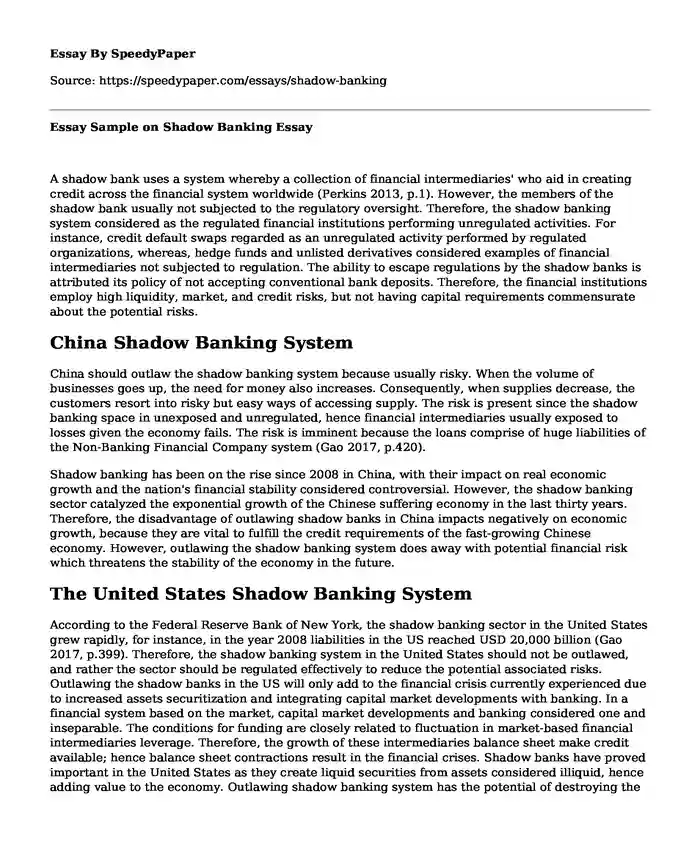A shadow bank uses a system whereby a collection of financial intermediaries' who aid in creating credit across the financial system worldwide (Perkins 2013, p.1). However, the members of the shadow bank usually not subjected to the regulatory oversight. Therefore, the shadow banking system considered as the regulated financial institutions performing unregulated activities. For instance, credit default swaps regarded as an unregulated activity performed by regulated organizations, whereas, hedge funds and unlisted derivatives considered examples of financial intermediaries not subjected to regulation. The ability to escape regulations by the shadow banks is attributed its policy of not accepting conventional bank deposits. Therefore, the financial institutions employ high liquidity, market, and credit risks, but not having capital requirements commensurate about the potential risks.
China Shadow Banking System
China should outlaw the shadow banking system because usually risky. When the volume of businesses goes up, the need for money also increases. Consequently, when supplies decrease, the customers resort into risky but easy ways of accessing supply. The risk is present since the shadow banking space in unexposed and unregulated, hence financial intermediaries usually exposed to losses given the economy fails. The risk is imminent because the loans comprise of huge liabilities of the Non-Banking Financial Company system (Gao 2017, p.420).
Shadow banking has been on the rise since 2008 in China, with their impact on real economic growth and the nation's financial stability considered controversial. However, the shadow banking sector catalyzed the exponential growth of the Chinese suffering economy in the last thirty years. Therefore, the disadvantage of outlawing shadow banks in China impacts negatively on economic growth, because they are vital to fulfill the credit requirements of the fast-growing Chinese economy. However, outlawing the shadow banking system does away with potential financial risk which threatens the stability of the economy in the future.
The United States Shadow Banking System
According to the Federal Reserve Bank of New York, the shadow banking sector in the United States grew rapidly, for instance, in the year 2008 liabilities in the US reached USD 20,000 billion (Gao 2017, p.399). Therefore, the shadow banking system in the United States should not be outlawed, and rather the sector should be regulated effectively to reduce the potential associated risks. Outlawing the shadow banks in the US will only add to the financial crisis currently experienced due to increased assets securitization and integrating capital market developments with banking. In a financial system based on the market, capital market developments and banking considered one and inseparable. The conditions for funding are closely related to fluctuation in market-based financial intermediaries leverage. Therefore, the growth of these intermediaries balance sheet make credit available; hence balance sheet contractions result in the financial crises. Shadow banks have proved important in the United States as they create liquid securities from assets considered illiquid, hence adding value to the economy. Outlawing shadow banking system has the potential of destroying the liquidity provision in the economy.
Conclusion
The United States of America economy is rather stable when compared to the Chinese economy. Therefore, outlawing shadow banking in China proves beneficial to her financial stability, since massive lending without regulation accumulates into high debt levels. Moreover, investments, as practiced by the insurance sector, is threatened. Whereas outlawing shadow banking in the US, will only add to the financial crisis in the economy regarding lack of funding, as value cannot be created from the illiquid assets.
Works cited
Gao, Simin. "Disequilibrium between Regulation And Criminalization To Counter Financial Misconduct: The Case Of Shadow Banking In China." American Business Law Journal, vol 54, no. 2, 2017, pp. 393-456. Wiley, doi:10.1111/ablj.12102.
Perkins, Ryan. "Shadow Banking Threatens China's Economy but What Is It, Exactly?". Atlantic Online, 2013, pp. 1-3., Accessed 17 Jan 2019.
Cite this page
Essay Sample on Shadow Banking. (2022, Nov 10). Retrieved from https://speedypaper.com/essays/shadow-banking
Request Removal
If you are the original author of this essay and no longer wish to have it published on the SpeedyPaper website, please click below to request its removal:
- Application Essay Example for Master's in Public Health
- Free Essay: Impact of Utilizing Information Technologies in Combating Digital Crime and Digital Terrorism
- Melin Collection - Art Essay Example
- Pros of Using Pfcs to Raise Pay for 21st-Century Airport Infrastructure. Free Essay
- Free Essay: Production and Sales of Tobacco Should Be Illegal
- Free Essay: Strategies Adopted by Civil Rights Leaders
- Paper Example: The Stanford Prison Experiment
Popular categories





